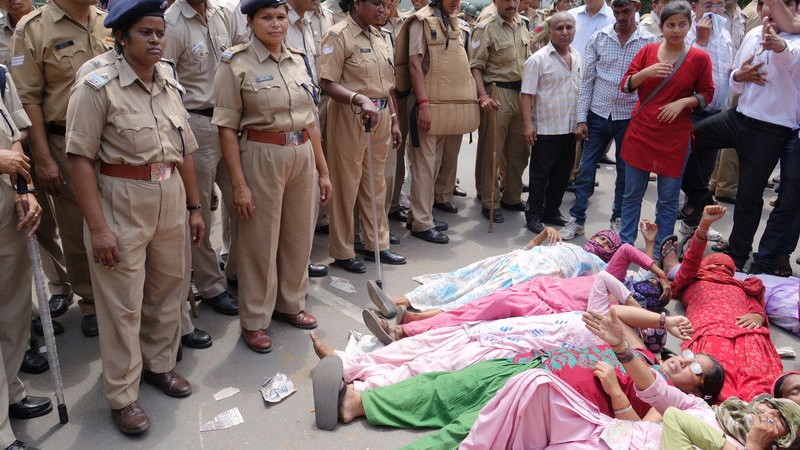 |
| Protesting the authorities' inaction about a rape case of Dalit women in Haryana. Image by Rajeev R Singh. Copyright Demotix, 11 May 2014. |
Statistics from different sources reveal that crimes against Dalits are on the rise. The State Minister for Employment Guarantee Scheme, Nitin Raut made a statement in May 2014 that, compared to previous years 548 more cases of atrocities were registered in Maharashtra during 2013-14.On the morning of May 17, six people attacked Sanjay Khobragade, a Dalit rights activist from the Kaulewada village, in the Gondia district of Maharashtra. The reason for the brutal assault was a caste-based dispute about land. Khobragade was sleeping in his courtyard when when assailants set him ablaze, dousing him with kerosene. Khobragade succumbed to his injuries 6 days later at the Civil Hospital in Nagpur, Maharashtra. Khobragade recorded a video testimony before he passed away. (A warning to readers: this video contains graphic imagery.) Based on Khobragade's statement, police arrested 6 men. The suspects have strong political connections to the ruling Bharatya Janata Party, however, and managed to fabricate a story that Khobragade’s wife, Devakabai, and her so-called paramour, a poor rickshaw-puller named Raju Gadpayle, killed him when he discovered their affair. As the men Khobragade fingered for his murder went free, police arrested his wife and Gadpayale, torturing them until they confessed to the crime. Today, the 6 men Khobragade named in his dying declaration are free on bail, while his wife remains in jail. Khobragade's son, Pradeep, has launched a petition titled, "My Mother Didn't Kill My Father. Investigate the Murder of Dalit Rights Activist, Sanjay Khobragade," which says, “We all know that by killing my father, the ‘higher-caste’ community wanted to set an example that Dalits should not speak up." Video Volunteers has highlighted discrepancies in the police investigation of Khobragade's murder:
It seems, the police and District level administration have conspired to cover up this case of Dalit atrocity and have therefore carefully plotted to highlight this as a murder plot hatched out of an extra-marital relationship.Nilesh Kumar, a researcher at the Tata Institute of Social Sciences in Mumbai, has studied a fact-finding report by the NGO Round Table India and concluded:
The Dalit woman, her body, her character has always been an easy target. In cases of caste atrocities, it is always a Dalit woman who is worst affected. A similar pattern was seen here. To shield the real accused, the police targeted Devakabai. They wove a fictitious story and accused her of having an illicit relationship. A 48-year-old woman was accused of getting sexually involved with her 41-year-old neighbor. The police, cleverly, got a few villagers from the dominant caste to testify in its support.According to Round Table India, Khobragade lost his life over a dispute about land. He was involved in leading Kavalewada's Dalits in a campaign to build a Buddhist community center on land the government granted them in 2012. Members of the area's "higher-caste" Hindu community have opposed this plan, wanting instead to build their own temple on the same spot. If life for Dalits and other "undesirables" is ever meant to improve, the public will have to take a greater interest in horror stories like Khobragade's. Unfortunately, India's mass media has devoted very little coverage to his brutal murder. If laws and constitutional protections alone were enough to absolve Indians of untouchability, Sanjay Khobragade would be alive today.
The post was first published in Global Voices Online
























0 comments:
Post a Comment